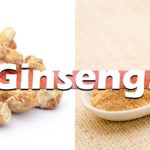Ginseng has been used for centuries for a variety of physical ailments. In the last fifty or so years, however, medical experts have begun to uncover some of the herb’s more subtle, psychological effects, many of which are very beneficial.
Today Ginseng is more popular than ever with people touting benefits from increased energy and motivation to decreased depression and fatigue.
First, a quick reminder of what ginseng really is:
What is Ginseng?
Ginseng is a plant, the roots of which are ground into a medicinal supplement popular around the world.
There are two main types of ginseng: American ginseng, and the more common Asian (or Korean) ginseng. Studies have found that the different types have different benefits.
There are other supplements like “Siberian ginseng,” and “Indian ginseng” (which is actually Turmeric) which are called by the same name, but all real ginseng belongs to the genus “Panax” and is distinguished by the fact that it contains compounds called “ginsenosides.”
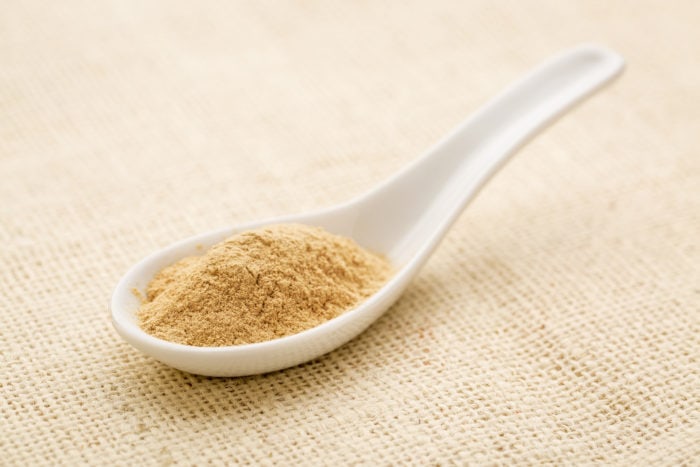
organic ginseng root powder on a white Chinese spoon against burlap canvas
You can get ginseng in capsule form, in tea, or just as a powder that you can add into food or shakes. No matter how you take it, ginseng has many health benefits that are sure to improve your overall wellbeing…
Let us get into it!
Ginseng May Help Give You Energy
One of the best things about ginseng is that it seems to give you energy. While measuring increased energy levels in humans is a difficult empirical task, there is a library’s worth of evidence pointing to the fact that they are affected by ginseng in a positive way.
Ginseng for energy is often added to caffeinated drinks and teas. The herb goes particularly well with caffeine. While caffeine gives more instant, short-term gratification, ginseng has a more delayed longer-term effect. A perfect pairing.
Ginseng Is Inexpensive
One reason people started taking ginseng in the first place is that it is an inexpensive, readily available root which, for years, was only consumed by peasants. But as word traveled from the lower socioeconomic classes upward, companies started packaging it, distributing it, and selling it back in the west. And the rest, as they say, is history.
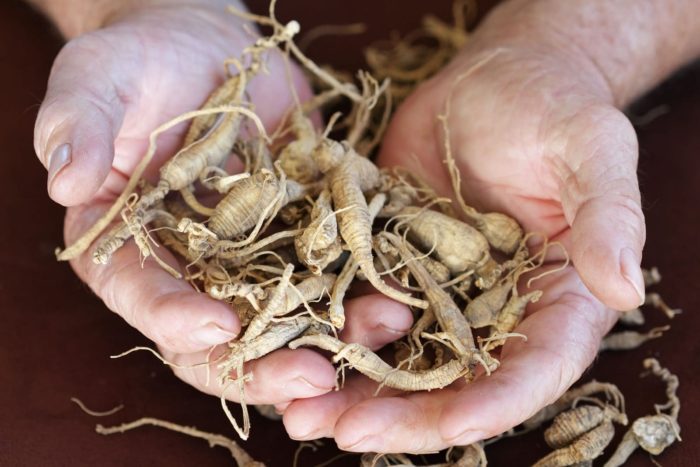
Elderly man’s hands holding harvested ginseng from the Appalachian area of the United States.
Ginseng May Help Depression
The medical understanding of depression has come a long way since people first started taking ginseng. Today we know that Ginseng can not only help in obvious physical ways (like with soothing your digestion and stabilizing your blood sugar) it can also help treat depression.
While the specific biological explanation for depression is still fairly opaque, scientists agree it has at least something to do with the chemical composition of the brain. As in, the amount of serotonin and dopamine in the brain. It has been suggested that THAT is the level on which an adaptogen like ginseng tends to work.
What Are Adaptogens?
Adaptogens are non-toxic plants that help the body resist stressors of all kinds, whether physical, chemical or biological.
These herbs and roots have been used for centuries in Chinese and Ayurvedic healing traditions, but they’re seeing a renaissance today. Some, like holy basil, can be eaten as part of a meal, and some are consumed as supplements or brewed into teas.
Adaptogens may tweak hormone production and physiological responses to stress to ensure that your body—from your mind to your immune system to your energy levels—functions as it should…
Basically, if you want to understand adaptogens, just think of homeostasis: Adaptogens help bring your body back to the middle and achieve homeostasis. A pleasant place to be, for sure.
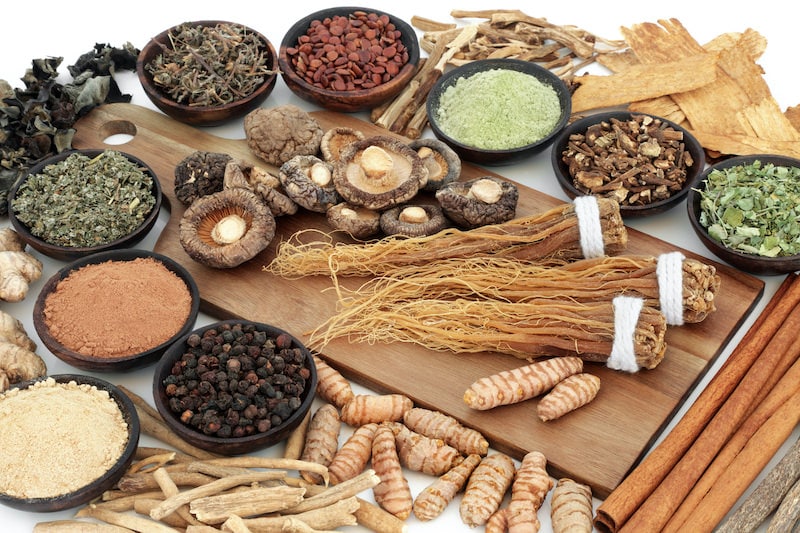
Adaptogen food assortment on display
Do adaptogens like Ginseng really work?
The question of whether or not adaptogens like ginseng really work has been asked by many. The thing is, though, that are so many different kinds of adaptogens that it may be counter productive to group a more established herb like ginseng with some lesser-researched ones.
So, while we can’t speak for all adaptogens, it is safe to say that ginseng does indeed work.
That said, there’s not much scientific research on how adaptogens affect human health. Most studies have been conducted either in animals or in human cell samples; even those that have been published tend to appear in small, niche journals.
While there’s plenty of research to suggest that what you eat affects your health, from reducing inflammation to helping you sleep better, it’s too soon to tell whether adaptogens can have such a direct and significant effect on the body.
How Do Adaptogens Work?
Adaptogens work on the hypothalamic-pituitary-adrenal axis and the sympathoadrenal system. Which are both involved in the body’s response to stress.
When you take adaptogens, you’re helping to train your body to handle the effects of stress in a healthy way.
This is done through tweaking hormone production and the physiological response to stress to ensure that your body from your mind to your immune system and energy levels function as they should.
Why Do You Need Ginseng and Other Adaptogens?
Your body is built to release the hormone cortisol to respond to stress. The problem is that we no longer experience acute bouts of stress but long and sustained ones – meaning we have long sustained levels of cortisol in our body. And elevated cortisol levels over long periods and chronic stress can affect every physiological system in your body – including your thyroid and adrenal glands.
We know that cortisol in the short term is excellent – helping your body fight off whatever is invading it. But over the long run, it leaves your body spent.
Research shows that adaptogens have a protective effect when it comes to calming the stress response and promoting adrenal health {and hormonal health}.
If you’ve been working on a healthy lifestyle for a while and you’re ready for another level – I think it’s time you consider adding adaptogens like ginseng to your diet.
Why Are Adaptogens Important?
Herbs are purported to be a great source of antioxidants, they are supposed to help your energy levels, level your blood-sugar, help you lose weight, and a number of other things? No wonder they’re so popular!
Especially considering more and more people (as in a greater percentage) are getting addicted to pharmaceutical drugs every year. Over 400,000 people were treated for stimulant addiction just last year. People are eager for more natural, healthy alternatives.
Another popular and unhealthy antidote for stress has become energy drinks, made up primarily of caffeine and sugar. These drinks may be associated with a number of serious health problems, affecting sleep, causing weight gain and even spiking blood pressure.
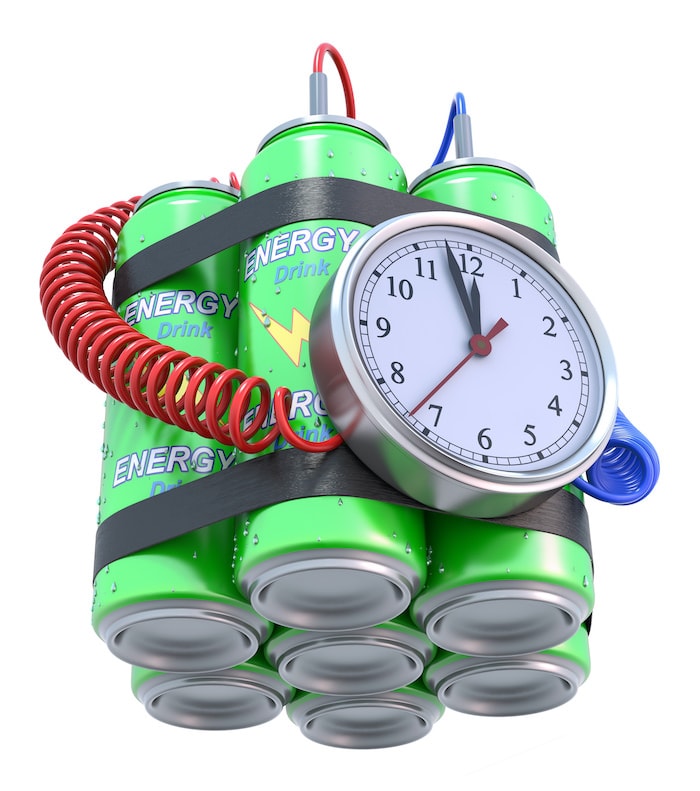
Energy drinks – A health timebomb
Evidence suggests they may lead to substance abuse, mental health problems, a higher diabetes risk, tooth decay, and kidney damage. Most energy drink “fans” would argue that they aren’t “addicted,” but if addiction is not repeatedly doing something that is bad for you for in the long-term for simple, short-term pleasure, then what is it?
Adaptogens work to restore our bodies to more natural states. States where we have energy and feel good but are not jittery and seeking a constant “more, more, more.” Adaptogens like ginseng work not only in positive ways, but also by eliminating the negative impact of some of the stressors that surround us every day in the modern world. Such stressors are chronic such as pollution, unhealthy food, noise, jobs, personal relationships and information most of which don’t demand a physical response.
General Adaptogen History
Scientists started applying the term adaptogen so herbs like ginseng back in 1947.
The first to do so was the Soviet toxicologist N. V. Lazarev. In 1958, Soviet researchers provided the definition that adaptogens “must be innocuous and cause minimal disorders in the physiological functions of an organism, must have a nonspecific action, and usually [have] a normalizing action irrespective of the direction of the pathological state.” After the breakup of the Soviet Union, Russian scientists continued to lead the way in adaptogen research.
The Soviets were very excited about such research and they discovered a lot. Adaptogens, for example, proved to be a safe, natural, and legal substitute for synthetic anabolic steroid drugs, says Tabachnik pointing to a 50 per cent decrease in immune system damage and a 50 per cent decrease in drug dosage among patients receiving anti-cancer chemotherapy for gastric cancer.
Moreoever, Eleutherococcus, also known as “Siberian ginseng,” although it is not a true ginseng or is from Siberia, was also extensively researched, he says. Studies showed a 40 per cent decrease in high blood pressure and heart disease and a 30 per cent decrease in reported symptoms among auto factory workers, improved productivity and a 30 per cent reduction in the risk of developing influenza among long-distance truck drivers.

Pushpin on Moscow
Adaptogens improved stamina and recovery, as well as increased oxygen intake and better performance among Soviet Olympic and other high-level athletes, he says. Despite these results, news about adaptogens remained a closely guarded secret of the Soviet state, so until recently this research never reached Western scientists.
Another herb of interest to the Russians was Rhodiola Rosea, which has been used for centuries in Russia and Scandinavia. Supposedly, Vikings knew about its endurance-enhancing abilities. The government took these experiments so seriously that scientists were banned from speaking of their results or publishing their findings outside the country.
The herb Schisandra Chinensis gained recognition as an adaptogen in the official medicine of the USSR in the early 1960s, principally as a result of a large number of pharmacological and clinical studies carried out by Soviet scientists in the preceding two decades. Today, Schizandra has secured an established position within the medicine of Russia/USSR as evidenced by the inclusion of the drug in recent editions of the National Pharmacopoeia of the USSR and in the State Register of Drugs.
Solid Evidence in Favour of Adaptogens?
According to a number of legitimate medical sources, including the University of Michigan Medicine, certain Adaptogens, do certainly have some physiological benefits. Others, however, still need some research.
Adaptogens that are good for mood and stress
While ginseng ranks top among them, there are a number of other holistic remedies which work wonders on stress and even elevate your mood.
Ashwagandha
Ashwagandha is known for its power at reducing oxidative stress. Oxidative stress is known as the internal process that contributes to cell damage and accelerated aging. Again, working on the stress response in the human body to improve the quality of life.
Chamomile
Chamomile, which comes from the Matricaria recutita plant, and its role in helping to manage depression and anxiety.
The results show that chamomile produced more significant relief from depressive symptoms than a placebo. However, further studies are necessary to confirm the health benefits of chamomile in treating depressive symptoms.
SAMe
SAMe is short for S-adenosyl methionine. It is a synthetic form of a chemical that occurs naturally in the body. SAMe is a very interesting and potentially helpful adaptogen that has been shown to perform as well as some over-the-counter pharmaceuticals for patients with depression.
SAMe is not, however, something that you want to start taking lightly. You should do your research and consult your physician before taking the supplement as it may have adverse interaction with your diet or other supplements you may be taking.
Fish Oil
Fish oil is one of the best supplements for your overall wellbeing. From heart health to blood pressure and skin and hair, fish oil can make you look and feel much better.
Maca
Maca is your hormones superpower. Some believe it can solve all your period problems. While that’s a bold statement, maca has been shown to help your body adapt to the stressful life situations that might otherwise deplete your body’s hormone production and cause problems.
Working Out
Diet is important when it comes to stress and mood. You cannot, however, forget about the necessity of having good, positive behavioural patterns in your life. One such pattern that everyone should incorporate is working out. Everyone has time for at least some physical exercise every day.
Whether it’s just a half-an-hour of light cardio or two hours of heavy powerlifting, working out will not only make you look better, you’ll feel better too!


